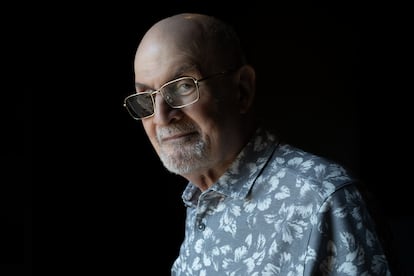Salman Rushdie: ‘Musk does not defend freedom of expression; he curates the discourse of the extreme right’
The British-Indian writer speaks to EL PAÍS about his new relationship with death, what Netflix failed to reflect about ‘One Hundred Years of Solitude,’ as well as the crisis within the founding myth of the United States being a country of immigrants. ‘Americans should be careful what they wish for’


Salman Rushdie, 77, has an excellent sense of humor.
The Indian-born British and American author — who survived 15 stab wounds during a knife attack in 2022 — recently stopped by the Hay Festival in Cartagena, Colombia. He presented his memoir, Knife (2024), which reflects on the attack that nearly killed him. He told the public in Colombia that they have friendly faces, less threatening than the one who, in August three years ago, attacked him in front of a similar audience.
During his conversation with EL PAÍS, Rushdie — who was threatened with death in 1989 for his book The Satanic Verses — points out that, at the time, literary critics forgot to read between the lines of the humor that he sprinkled his books with.
The recent attack against him took away his desire to go to public events, but he has returned as an act of resistance, with the love of his family in one hand and laughter in the other. He spoke to El PAÍS about the poetry that Netflix lacked while adapting One Hundred Years of Solitude, and about his new relationship with death. He also discussed the ongoing immigration crisis in the United States.
Question. The first time you came to Cartagena — in 2009 — you asked not to have bodyguards, because you wanted to walk freely through the city. After being so close to death in 2022, do you still resist the presence of bodyguards?
Answer. Yes, I resist, except in front of a very large audience, like last night. When there are more than a thousand people, it’s impossible not to take precautions. The Hay Festival has dealt with the issue in a very professional manner, ensuring security without it being too intrusive for the audience. I wish it weren’t like that. I used to live a perfectly normal life, but now I can’t risk a new attack.
Q. Does it make you nervous to be in front of a large audience?
A. I’m still getting used to it. For a long time, I decided not to do public events. I was very sensitive, I didn’t feel ready. But I don’t want to spend the rest of my life being invisible. When Knife was published, I did a few events: in Germany, France, Italy, a small one in Spain. I’m learning again. My instinct tells me not to overdo it with security, because the danger isn’t an army of people against me. In 2022, it was just one individual, a crazy man, who attacked me.
Q. You always talk about how love helped you recover from that traumatic event. But those who know you well say that you have a very good sense of humor. Has laughter helped you?
A. Yes. And it has always been like that. In my first books, when people reviewed them, they said they were very funny. Then — since what happened with The Satanic Verses wasn’t funny at all — people stopped talking about my texts as being funny, even though my way of writing didn’t change.
Now, this has changed somewhat over the years: I’ve been allowed to be funny again, but my humorous writing has always been there.
Q. When you were threatened with death in 1989, you say that many people were afraid to be around you. They kept their distance. Did something similar happen after the attack?
A. No, not at all, quite the opposite. Even in 1989, of course, there was an element of fear, but my friends were very loyal, very close. That helped me a lot. The fear was mostly in the circle of people after them. I also wondered if the same thing would happen this time, but no, it didn’t. And, to be very clear: I think that. if someone tries to kill you, people feel a lot of empathy towards you. Many people were happy that I didn’t die.
Q. Did your relationship with death change after that episode?
A. I feel closer to it. None of us know how this film — our life — is going to end. But I was able to see the trailer before the end; I could see that I was dying. It was a powerful moment and, literarily, very interesting, because it makes you think a lot about death. In my family, women reached the age of 100, while the men didn’t. So, I hope to follow the female line of the family more.
Q. Have you thought about writing anything else about this new relationship with death, besides Knife?
A. Yes. Although I have no idea how to do it. I think that, when something so significant happens in the life of an artist, it will be reflected in their work in one way or another. How it will come out, I cannot tell you, but I’m sure that it will.
Q. One Hundred Years of Solitude (1967) was a great influence on your literature. How close were you to Gabriel García Márquez?
A. I think about him every time I come to Colombia. We never met, but we did speak once on the phone, thanks to [the Mexican novelist] Carlos Fuentes. I was in Mexico City, having dinner with Fuentes, who said, “It’s crazy that you two don’t know each other.” García Márquez was in Cuba, visiting Fidel [Castro]. Carlos went into a room and called Havana. He then handed me the phone. We had a very long conversation, an hour long, very friendly. He told me that, at his age, he didn’t read much except in Spanish, but that he always wanted to know what two writers were up to: [the South African novelist J.M.] Coetzee and me.
[Moved, Rushdie touches his heart with his left hand.] It was a huge compliment, I’ll never forget it.
Q. Is magical realism still important in your work?
A. I resist the term, because it seems to me that magical realism belongs to Latin America. Cortázar, Asturias, Carpentier, Manuel Puig and others… the term belongs to them. Where I come from [India], the fantastic tradition is more powerful than realism. That’s what I felt when I started reading these Latin Americans: “how similar.”
Back then, the world for me was that of India and Pakistan, where religion is powerful, with a history of colonization, with military interventions in politics, with abysmal differences between rich and poor, between cities and the countryside. I found echoes in Latin Americans. I recognized myself: the priests in the books were my mullahs, those generals were my generals.
Q. Have you watched the Netflix adaptation of One Hundred Years of Solitude?
A. I’ve seen it. I think they made a great effort; I found the creation of Macondo convincing. But it’s not One Hundred Years of Solitude, because that story lives in the language of the book. And you can’t film the language. The book has very little dialogue, so, for the series, they had to invent the dialogue, and, I’m sorry to say, it’s not at the same level as the language of the book.
My wife and I enjoyed the series, but it’s anything but magic. The most interesting thing about the book is that the surreal is treated in such a normal way — like Remedios the Beauty going up to heaven — while technology terrifies them, like when the train arrives in Macondo and frightens the people. That’s one of my favorite parts of the book: when the train arrives and a woman runs [though the town], saying that something terrible is coming. What scares Macondo is modernity.
Q. Speaking of technology: as someone who has defended freedom of expression with his life, what do you think of Elon Musk when he says that he defends free expression by allowing all kinds of speech on his social media network X?
A. Elon Musk doesn’t defend free expression. His social network curates the discourse of the extreme-right. Appropriating a noble cause — such as freedom of expression — when what you really do is the opposite is very dishonest. I’m not a fan of Mr. Musk. And I would love for him to be the first man on Mars.
Q. So that he stays there…
A. Yes, let him go. If he likes it so much, then let him go. I once met him, in Los Angeles, 10 years ago. And he said that it would take seven years to get to Mars. Seven years have already passed, and I really want him to leave.
Q. You’re of Indian origin, but you’ve been an immigrant in the United Kingdom and the United States, countries where anti-migrant speech has gained a lot of political space. As someone who has fought against extremism, why do you think cultural values like tolerance or empathy have lost so much support?
A. Yes, those values are weaker now than at any other time in my life. I’m a double migrant, from India to England, from England to the United States. And, in my life, I’ve always tried to celebrate the more positive side of that. All that migration feeds culture. We live in an era of migration, a time in history when many people move around the planet for economic or political reasons. Isn’t the United States a nation of immigrants? Apart from Native Americans, everyone is a migrant. That’s been the case since the founding fathers. The great American myth is now said to be bad, evil. Even Elon Musk is from South Africa.
Q. And what happens in a society if the founding national myth collapses?
A. I think the world won’t stop having planes, ships. Movement will continue to happen; they cannot stop the world just because they don’t approve of it. Right now, we’re concerned about the issue of deportations in the United States, and Americans should be careful what they wish for. If they go ahead [and push people out], they’ll find that the price of food won’t go down, but rather, it’ll go up, because there will be no one to harvest the crops. The medical world will also be affected, because there will be fewer people working in hospitals. Absolutely every aspect of American life will be affected by deportations.
Sign up for our weekly newsletter to get more English-language news coverage from EL PAÍS USA Edition
Tu suscripción se está usando en otro dispositivo
¿Quieres añadir otro usuario a tu suscripción?
Si continúas leyendo en este dispositivo, no se podrá leer en el otro.
FlechaTu suscripción se está usando en otro dispositivo y solo puedes acceder a EL PAÍS desde un dispositivo a la vez.
Si quieres compartir tu cuenta, cambia tu suscripción a la modalidad Premium, así podrás añadir otro usuario. Cada uno accederá con su propia cuenta de email, lo que os permitirá personalizar vuestra experiencia en EL PAÍS.
¿Tienes una suscripción de empresa? Accede aquí para contratar más cuentas.
En el caso de no saber quién está usando tu cuenta, te recomendamos cambiar tu contraseña aquí.
Si decides continuar compartiendo tu cuenta, este mensaje se mostrará en tu dispositivo y en el de la otra persona que está usando tu cuenta de forma indefinida, afectando a tu experiencia de lectura. Puedes consultar aquí los términos y condiciones de la suscripción digital.








































